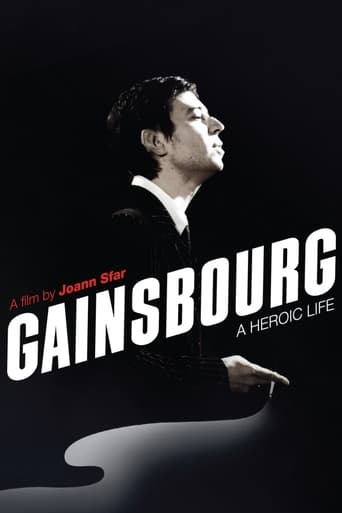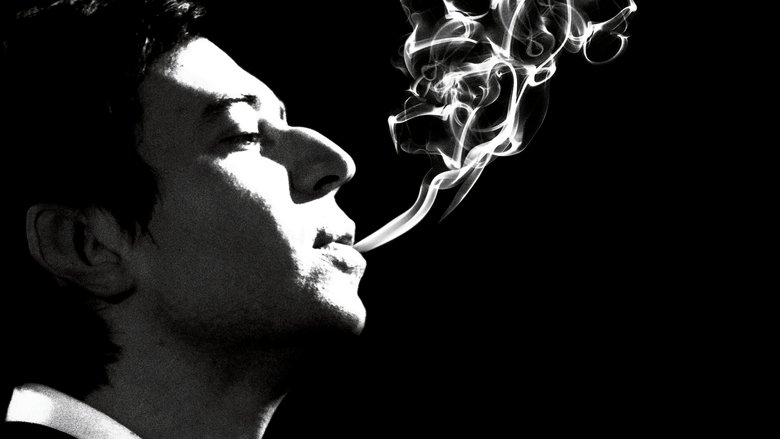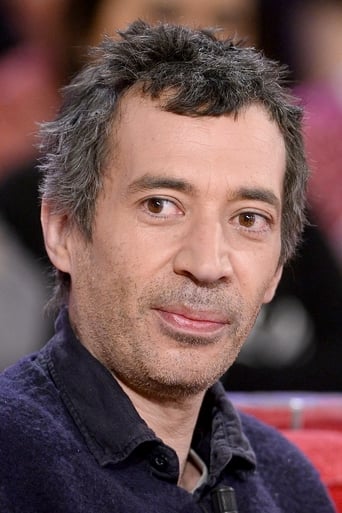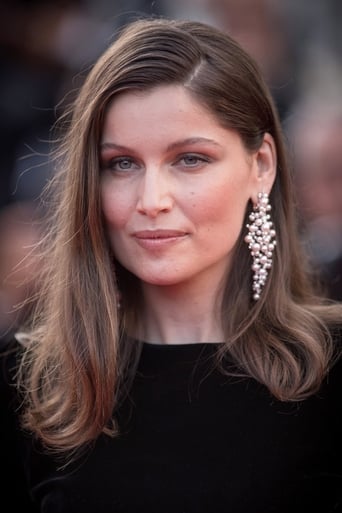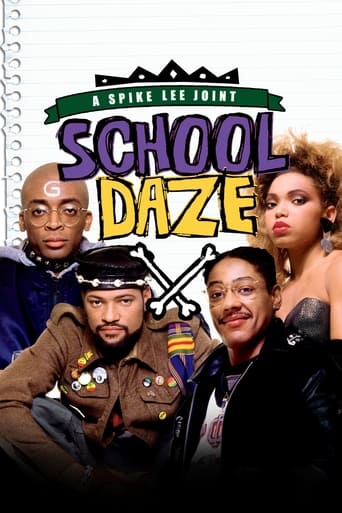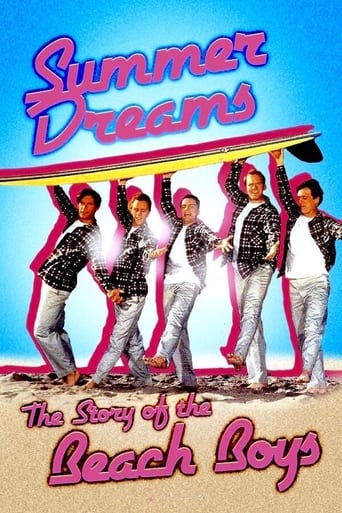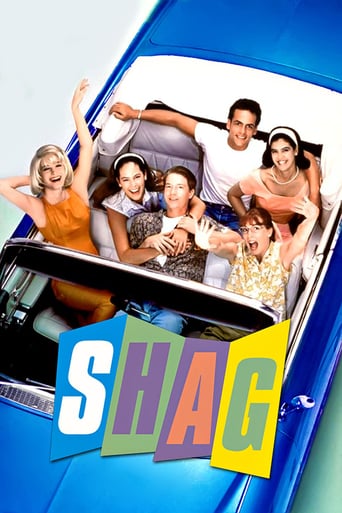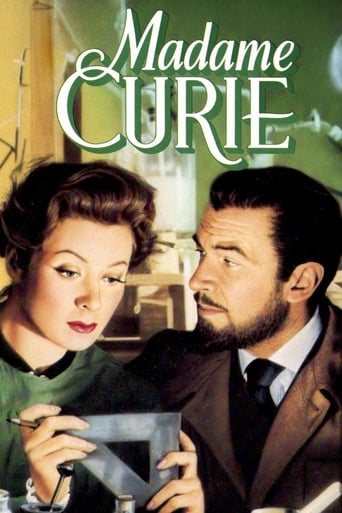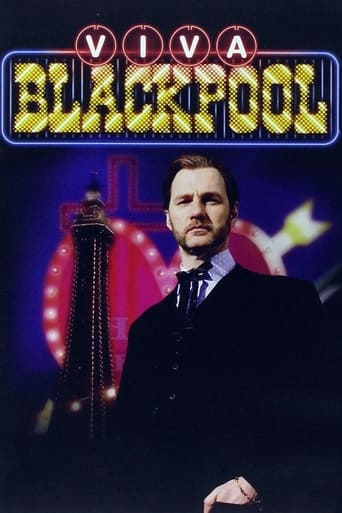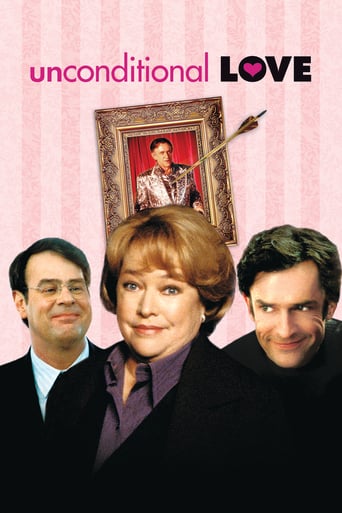Gainsbourg: A Heroic Life (2010)
A glimpse at the life of French singer Serge Gainsbourg, from growing up in 1940s Nazi-occupied Paris through his successful song-writing years in the 1960s to his death in 1991 at the age of 62.
Watch Trailer
Cast


Similar titles
Reviews
This movie tries so hard to be funny, yet it falls flat every time. Just another example of recycled ideas repackaged with women in an attempt to appeal to a certain audience.
The plot isn't so bad, but the pace of storytelling is too slow which makes people bored. Certain moments are so obvious and unnecessary for the main plot. I would've fast-forwarded those moments if it was an online streaming. The ending looks like implying a sequel, not sure if this movie will get one
One of the worst ways to make a cult movie is to set out to make a cult movie.
The thing I enjoyed most about the film is the fact that it doesn't shy away from being a super-sized-cliche;
Mildly interesting biopic on a French singer-songwriter who was apparently famous (probably only in France). More energetic and original than most biopics, it overdoes the imagery. The monster that flits in and out of scenes, representing Gainsbourg's dark side, I guess, is irritating from its first appearance and gets more irritating the more it appears.Cutting out the imagery and some of the more unnecessary scenes would have created a tight, fast-paced, and much more interesting movie. The ending was rather abrupt and unsatisfying too.Great performance by Eric Elmosnino in the lead role. Like Johnny Depp in Pirates of the Caribbean, I think he modeled his performance on Keith Richards' mannerisms. Good support from a cast which includes Laetitia Casta (as Brigette Bardot) and Lucy Gordon.
###### Might contain spoilers ######### I personally found the portrayal of decay one of the most impressive features in the movie. The character's fall naturally depicts the transition of the haute-couture from the war-years, which was yet a reminiscence of Golden Era, yet with a little less social exclusion, towards the chaotic and disturbing culture the re-building process in the post-war years.You can see it first in the transition of the protagonist's manners, which change from subliminally provocative in childhood towards openly ironic during the time spent with Brigitte Bardot - every attempt to remain sincere and "ernst" during this time must have been felt as a facre - , towards unreflected vulgar anti-everything proclamations you see in the re-make of the sex-driven song and the years after.Also, you can see it in the changing clothing, which slowly progresses and finally finds its point of no return when Gainsborg finds his British wife. First of all, it's the inter-national coupling, which of course introduces compromises on all sides, and which also makes him send away his visage, which is basically a symbol of his genius overall. What he sends away is the normed cultural knowledge he gained as an aspiring French intellectual. Accepting to embrace the then more inter-national culture, he becomes basically a perverse anti-hero which resembles the Proustian portray of Bloch. While he learns and transcends the inter-disciplinary approach towards the new culture, he becomes a torn-apart individual and ultimately an outsider for both the French and the British society, in which he lives, becoming truly an international cultural outlaw. (The first hint at his outlaw status is the rejection of his song written for Brigitte) So, his clothes change towards what you would think a typical drug-addicted rock-n-roll star outfit and has not the slightest scent of culture and style left. He resembles a little bit the latest pictures found on Dylan.But most interestingly is the attempt to relate this final breakdown with the his experience of WW2, something that is dominantly present in the scenes where he performs the Marseillese. You see that subconsciously, he still is haunted by his past, and while his embracement of earlier haute-couture allowed him to feel at home and at peace somehow with his country and intellectual background, the emergence of a new form of pop culture - loud clubs where electronic music is played, an Asian looking girl friend, a ton of Garbage art on his estate -, you can see that this last piece of hope and divinity, which he found in the art of chanson writing, falls apart and leaves him with nothing left than ruins.The entire biopic hence deals somehow with the cultural breakdown of the entire society due to the rebuilding process of post-war Europe, and the massive dilution of cultural products across borders, and the end of self-consciousness it introduces with itself.The last dignity, initially spared by the war experience and conserved in the intellectual networks of Paris, vanishes. And even worse, he probably experienced to have contributed to this mess. When the Asian looking girl comes straight to the point asking if he wanted to "fuck" her, while he was still trying to frame his intentions more elaborately as a gentleman, he must have ultimately realized that everything was over. He was not even part of the outlaw movement anymore. He was just some random individual that was perceived as following its most primal instincts. At that point, he say "NO. Don't you dare to leave." Another point of no return.Yes, because there he was. An alcoholic, post-intellectual and vulgar individual. What was left to do, but to escape everything and forget about what he once deemed important by making another baby and becoming a family man after all. The rage and violence have vanished in the final scenes, simply because anything that he could rage about was dead.Apart from that, as already mentioned, the film was catchy, atmospheric and somewhat epic.
The life and death of a musical legend is always a good excuse to make a film of grandeur. Even better if the deceased is as bizarre and sensual as the French social rebel Serge Gainsbourg. Serge Gainsbourg: Vie Heroique is the directorial debut from Franco-Belgian comic book writer Joann Sfar, slipping excessive imagination and the odd animation into the already overflowing glass of Gainsbourg's life story.The risqué lyrics of 'Je T'aime...Moi Non Plus', Brigitte Bardot enigmatically singing "SHEBAM! POW! BLOP! WIZZ!" in 'Comic Trip', Gainsbourg dancing with his fingers across pianos and guitars, and, of course, the comic viewing of old alcoholic Serge slurring in clubs beside young hipsters. What the film lacks in biographical detail it makes up for in the precocious glamour of Gainsbourg. It's probable that nobody could ever quite retell his life with the splendour that it deserves, but Sfar has certainly painted a video in a language that we can all understand. NM
This is a film that makes no bones about the ultimate squandering of Serge Gainsbourg's talents in a drink - induced decline but at the same time shows the creative and cultural force that his very surname still brings to mind for most French people . The movie brings out particularly well the smoky atmosphere of jazz clubs and gigs where the young Serge first plied his musicality in the 1950s. The phases of his life, from young Jewish boy in occupied France through his creative life and personal life ( for instance )amours with such as Brigitte Bardot and Jane Birkin in the 1960s are dizzily but effectively handled . There is some attempt by Director Sfar to portray Gainsbourg , in late career , as something of an anti- intolerance man of principle but the overall impression given is of an imaginative , somewhat amoral figure whose life was ultimately an example of artistic decline and hedonistic self-indulgence . The film is rather long but, overall , sustains interest well . The main roles are all played well by the actors ,including the female leads Laetitia Casta and the late Lucy Gordon , and the cartoon - like features of the movie , such as Serge's giant alter-ego , impressionistically contribute something positive to the story . Viewers from Anglophone countries who will best remember Gainsbourg as the singing half of the 1969 heavy- breathing pop hit " Je t'aime moi non plus " may still leave the cinema wondering what really was the artistic importance of Serge . Yet they will nonetheless , on the strength of this bio-pic , carry away an image of the principal character as an unforgettable personality .French people , on the other hand , who already regard him as a cultural icon and , in their terms ,as a genius will not need this movie to make up their minds about Serge Gainsbourg .

